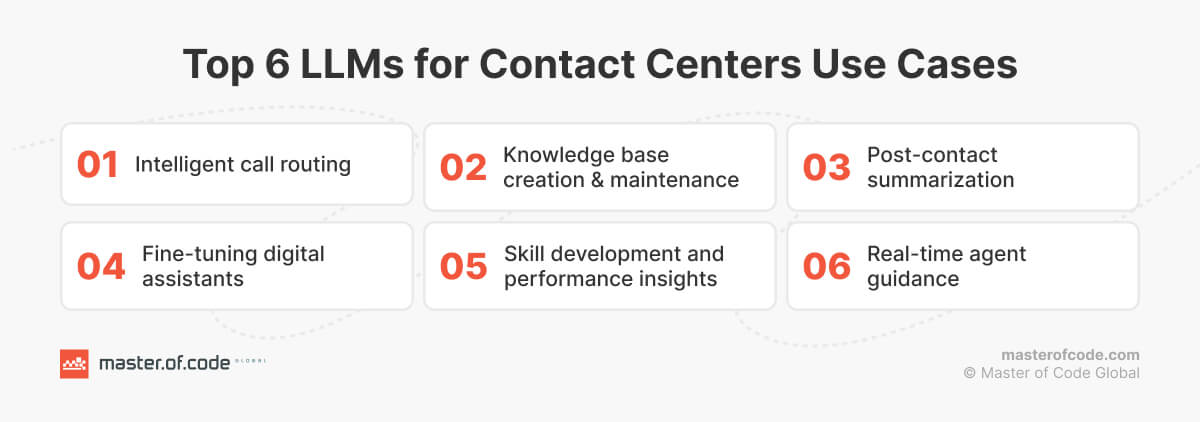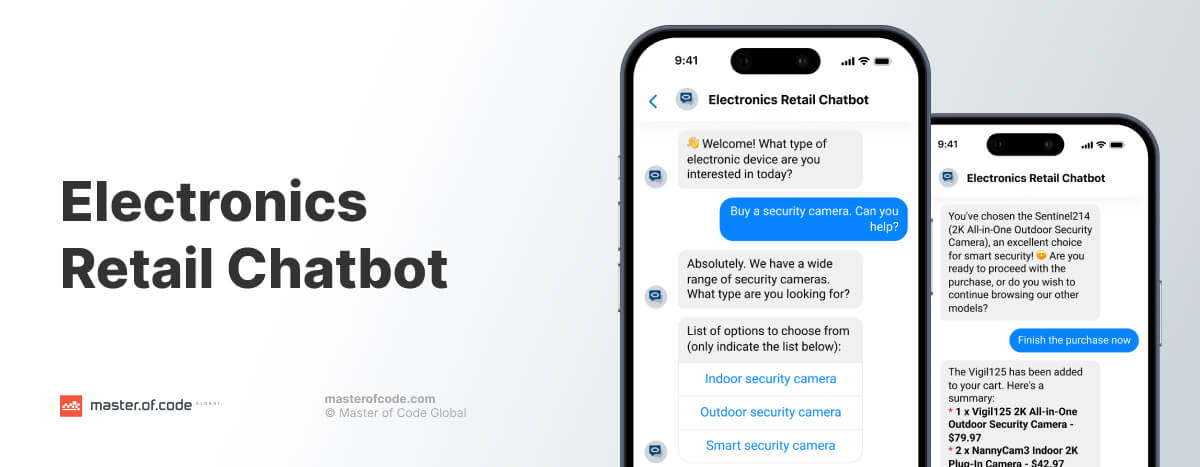The client support field is dynamic and demanding, with businesses facing challenges in delivering exceptional customer experiences (CX). High turnover rates, coupled with the ongoing need for agent training, significantly impact productivity and costs. For example, industry estimates suggest a 60% annual attrition rate for contact centers, costing firms $10,000 to $20,000 per manager to replace. To address these bottlenecks, supervisors dedicate significant time – often twenty hours per week – to coaching and upskilling newcomers.

Enterprise LLMs are emerging as a powerful solution to these common pain points. According to McKinsey, applying Generative AI within consumer care could boost efficiency while reducing expenses by 30% to 45%. Moreover, recent studies indicate that LLM-based conversational assistants drive a 14% average increase in issue resolution metrics. This includes a 34% improvement for novice agents, addressing the difficulty of education and retention. Additionally, the AI system can lead to a substantial reduction in escalation requests and attrition among new employees.
These statistics underscore the potential of LLMs for contact center operations transformation. In this article, we will explore six key use cases, discuss the benefits and limitations of language models, and offer expert recommendations for successful implementation. Let’s dive in!
Table of Contents
Language Models in Action: 6 Real-World Applications
We’ll start with exploring practical scenarios where LLMs customized for contact centers can refine customer service.

Intelligent Call Routing
LLMs are transforming support operations by acting as intelligent switchboards. Using advanced natural language processing (NLP), AI in call centers analyzes initial inquiries in real-time. The algorithm pinpoints keywords, intent, and the nature of the issue. The model can then route calls to the most appropriate agent with specific expertise. Alternatively, it directs callers to self-service options like FAQs or knowledge bases for quicker resolutions of common issues. This data-driven approach streamlines workload distribution, enhancing efficiency and client satisfaction.
Post-Contact Summarization
Generative AI for contact centers can also automate the task of call and chat summarization. By analyzing transcripts, LLMs generate concise summaries of interactions, highlighting key discussion points and required follow-ups. These notes are automatically integrated into CRM systems, improving efficiency and data accessibility.
For example, AWS offers its Live Call Analytics (LCA) solution to enhance this process. LCA utilizes real-time transcription services and customizable AI models to analyze conversations and extract main insights. The tool then adds the information directly into customer relationship management. Such a strategy elevates agent productivity and the overall user experience.
Knowledge Base Creation & Maintenance
Contact centers also implement language models to create self-learning knowledge hubs. By analyzing massive datasets of client interactions, FAQs, and manuals, these AI tools automatically extract key information and generate helpful materials. This way enterprises can build and continuously update a centralized data repository. Such storages equip both agents and self-service systems with the most accurate answers.
Master of Code Global took the concept of an AI-powered information bank a step further. We developed a solution for a leading Conversational AI platform that automates the generation of knowledge articles. The tool transforms past consumer dialogues into structured and readily available content. By automating the process, the time needed to assemble these resources is slashed from days to hours. Chatbots then draw upon the data to effectively answer frequently asked questions.
Skill Development and Performance Insights
Large language models excel at generating realistic interactions, providing new agents with a safe space to practice and receive feedback. These simulations cover diverse support scenarios. They allow managers to refine their responses before handling live calls or chats. Language models also analyze past conversations against company standards, flagging potential coaching opportunities. They also pinpoint best practices, promoting knowledge sharing within the team.
Real-Time Agent Guidance
LLMs in call centers analyze customer speech patterns and word choices to gauge sentiment. This allows agents to recognize subtle frustration or growing dissatisfaction. Eventually, AI encourages proactive adjustments in their communication style. Moreover, language models provide managers with tailored suggestions drawn from knowledge bases, past dialogues, and even the current conversation’s flow. Such intelligent guidance empowers agents to deliver an empathetic and highly effective CX.
For instance, one major insurance provider implemented an AI solution to track consumer sentiment. As a result, Metlife saw a 3.5% increase in first-call resolutions. The company also boosted client satisfaction scores by 13%. Additionally, the ability to monitor calls in real-time allowed for timely interventions when needed, further streamlining most interactions.
Fine-Tuning Digital Assistants
LLMs are also transforming customer service chatbots from simple FAQ machines to versatile helpers. By training models on client data, bots can now handle a wider range of common queries. Besides, they offer basic troubleshooting steps and guide users through standard processes. This frees up human agents for escalated issues, leading to shorter wait times and faster issue resolution. Furthermore, AI conversational systems provide self-service options enhancing CX around the clock.

The LLM-powered chatbot demonstrated remarkable results for the electronics retailer. Its ability to understand complex buyer requests and provide tailored product recommendations contributed to higher consumer engagement. This is evidenced by an impressive 84% engaged session rate and a high CSAT score of 80%. Additionally, Shopify integration streamlined the purchase process, resulting in an average order value of $300.
Benefits vs. Risks of LLMs in Contact Center Implementation
After exploring how AI models can be applied in various client support scenarios, let’s examine the tangible advantages they offer. The technology is capable of:
- Reducing operational costs through automation and efficiency gains
- Increasing client satisfaction with faster, more personalized service
- Scaling support operations to manage fluctuations in demand without proportional staffing increases
- Gathering deeper insights into user behavior and preferences to drive strategic decision-making
- Maintaining a consistent brand voice and quality across all communication channels
- Improving employee satisfaction by empowering agents with better tools and knowledge
- Expanding into new markets with multilingual capabilities
- Anticipating and resolving consumer issues proactively, preventing escalations
- Streamlining quality assurance processes to enhance overall contact center performance
- Accelerating the development and deployment of the latest self-service solutions
While AI algorithms present valuable opportunities, enterprises must be aware of LLMs’ limitations. Incorrect responses from language models can erode buyer loyalty and hinder effective problem-solving. Unchecked biases could perpetuate harmful stereotypes, damaging the company’s reputation. In addition, LLMs lack the emotional intelligence to handle complex situations, potentially frustrating customers. Finally, poor data privacy practices expose sensitive information, risking breaches and a severe loss of trust.
In order to help businesses address these challenges, we’ve asked our experts to share their recommendations. Here are some of them:
- Sviatoslav Safronov, Application Security Engineer: “To prevent exposing confidential data to the LLM and its creators, consider masking it. This way, the AI acknowledges the information’s existence but lacks a direct permit. Remember the principle of least privilege: don’t trust anyone implicitly and limit access to private records.”
- Oleksandr Gavuka, General Backend Engineer: “When developing our LLM-Orchestrator Open Source Framework, we also thought about this challenge. Eventually, we introduced a feature that allows it to handle sensitive information without LLM’s involvement, mitigating the risks of data exposure.”
- Tetiana Chabaniuk, AI Trainer: “For businesses using LLMs, it is important to understand that the hallucinations and biases can affect the quality of responses and the effectiveness of their use. I recommend introducing strategies such as the RAG architecture, pre-generation, and fine-tuning to minimize the identified threats in working with language models.”
- Olga Hrom, Delivery Manager: “LLM fine-tuning is a process that requires time and an iterative approach. The very first versions may produce incorrect answers, hallucinations, and other undesired outcomes. However, we try to engage the customers to give feedback and invest their time during the UAT (User Acceptance Testing) phase to make sure that the final version is exceptional. A language model is like a baby – the more you talk to it, the smarter it becomes!”
- Olga Bayeva, Project Manager: “For a chatbot with LLM component, particularly when handling sensitive topics like pricing, discounts, and deliveries, develop a knowledge base, craft detailed prompts, and establish strict policies to minimize deviations. Provide examples within prompts, especially when clients expect advice from the AI, for improved guidance and output control. Moreover, explicitly inform consumers when they are interacting with the technology. This way, you set appropriate anticipations and mitigate potential risks for the business.”
Tired of missed opportunities and slow response times? Deploy an AI-amplified assistant for 24/7 availability. Personalize interactions, qualify leads, and elevate your customer experience with the power of Generative AI.
GET IN TOUCH
Wrapping up
As witnessed, LLMs in call centers are leveling up the landscape at an unprecedented scale. Their ability to streamline processes, enhance agent performance, and improve the client experience makes them a compelling investment. While challenges remain, careful planning and a strategic approach ensure successful implementation.
As an LLM development company, we specialize in tailoring solutions that transform customer service operations. Are you ready to explore how AI models can elevate your customer service operations? Contact us today to schedule a consultation and discover the possibilities for your business.
We analyze your pain points and address them with automation.







